 February 2022 in “Mediators of Inflammation”
February 2022 in “Mediators of Inflammation” Women with Polycystic Ovary Syndrome (PCOS) have lower levels of a substance called DIAPH1 in their blood, which is linked to changes in sugar metabolism and insulin resistance.
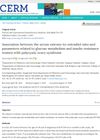 4 citations,
December 2021 in “Clinical and Experimental Reproductive Medicine”
4 citations,
December 2021 in “Clinical and Experimental Reproductive Medicine” Higher estrone-to-estradiol ratios are linked to worse glucose metabolism and insulin resistance in women with PCOS.
 155 citations,
March 2006 in “The American Journal of Medicine”
155 citations,
March 2006 in “The American Journal of Medicine” Women with PCOS have heart-related issues not because of obesity, but due to insulin resistance and low adiponectin levels.
September 2002 in “Fertility and sterility” Girls with PCOS often start puberty earlier and have signs of insulin resistance from a young age.
 195 citations,
November 2019 in “Clinica Chimica Acta”
195 citations,
November 2019 in “Clinica Chimica Acta” High levels of male hormones, insulin resistance, and obesity are closely linked and worsen polycystic ovary syndrome, but more research is needed to improve treatments.
39 citations,
August 2001 in “Clinical endocrinology” Lean and obese women with PCOS have similar levels of insulin resistance, indicating it's a core aspect of the condition.
6 citations,
December 2021 in “International Journal of Endocrinology” The genetic variant studied does not affect PCOS symptoms in Kashmiri women.
 53 citations,
December 2015 in “JAMA Dermatology”
53 citations,
December 2015 in “JAMA Dermatology” Women with PCOS often have more body hair, acne, and skin darkening, and these signs are linked to metabolic issues like insulin resistance and high cholesterol.
 20 citations,
March 2017 in “Reproductive Biology and Endocrinology”
20 citations,
March 2017 in “Reproductive Biology and Endocrinology” Women with PCOS have higher 5α-reductase activity, which may be linked to insulin resistance.
 22 citations,
June 2017 in “Advances in Clinical and Experimental Medicine”
22 citations,
June 2017 in “Advances in Clinical and Experimental Medicine” Polycystic ovary syndrome (PCOS) was first described in 1721, officially diagnosed in the 1990s, and is now known to be partly genetic and linked to insulin resistance, with increased risk of cardiovascular disease and carbohydrate metabolism issues.
 15 citations,
April 2019 in “Best Practice & Research Clinical Endocrinology & Metabolism”
15 citations,
April 2019 in “Best Practice & Research Clinical Endocrinology & Metabolism” Polycystic Ovary Syndrome (PCOS) in teenagers is a complex condition linked to genetics and environment, often associated with obesity and insulin resistance, and is treated with lifestyle changes and medication.
 1 citations,
May 2023 in “Cell reports medicine”
1 citations,
May 2023 in “Cell reports medicine” Sons of mothers with polycystic ovary syndrome (PCOS) have a higher risk of obesity and insulin resistance, possibly due to certain genes and factors passed down from their mothers.
1947 citations,
September 1995 in “New England journal of medicine/The New England journal of medicine” PCOS is a common hormonal disorder causing irregular periods and increased hair growth, linked to insulin resistance and long-term health issues.
 61 citations,
January 2015 in “Hormones”
61 citations,
January 2015 in “Hormones” Liraglutide caused significant weight loss in some obese women with PCOS, especially those with severe obesity and insulin resistance.
16 citations,
November 1998 in “Fertility and sterility” Doctors used to view PCOS too narrowly, but now understand that insulin resistance is a key factor in the condition.
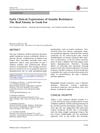 11 citations,
December 2017 in “Diabetes Therapy”
11 citations,
December 2017 in “Diabetes Therapy” Recognizing and treating early signs of insulin resistance can help prevent type 2 diabetes and improve life quality.
 2 citations,
May 2010 in “Journal of Obstetrics and Gynaecology Canada”
2 citations,
May 2010 in “Journal of Obstetrics and Gynaecology Canada” PCOS is a complex condition linked to hormonal imbalance and insulin resistance, with weight loss being important for management.
 June 2024 in “Research Square (Research Square)”
June 2024 in “Research Square (Research Square)” Young women in West Bengal, India, with PCOS often have estrogen resistance, leptin receptor issues, folate deficiency, T2DM, and acanthosis, commonly linked to obesity.
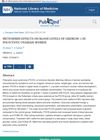
Metformin lowers gremlin-1 and improves insulin resistance in women with PCOS.
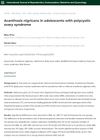 February 2022 in “International journal of reproduction, contraception, obstetrics and gynecology”
February 2022 in “International journal of reproduction, contraception, obstetrics and gynecology” Acanthosis nigricans in teenage girls with PCOS is a sign of obesity, not insulin resistance or glucose intolerance.
 December 2021 in “Acta Marisiensis”
December 2021 in “Acta Marisiensis” Insulin resistance increases the risk of developing type 2 diabetes and other health issues.
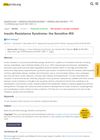
Insulin resistance is linked to many health problems and is influenced by diet, genetics, and other factors.
 April 2016 in “JAMA Dermatology”
April 2016 in “JAMA Dermatology” Acne is not a key diagnostic feature for PCOS, postadolescent men with acne may have insulin resistance, melanoma patients often have few moles, tumor size in CSCC indicates higher risk of serious outcomes, and hidradenitis suppurativa is linked to higher risk of heart problems and death.
 December 2006 in “Annales D Endocrinologie”
December 2006 in “Annales D Endocrinologie” Estrogen-progestin contraception lowers ovarian, endometrial, and colon cancer risk but may raise breast and cervical cancer risk, helps with menstrual and acne issues, and new methods are as effective as pills. Metformin helps overweight women with PCOS and insulin resistance, and dopamine agonists treat prolactinomas.
 2 citations,
January 2023 in “Research Square (Research Square)”
2 citations,
January 2023 in “Research Square (Research Square)” Managing emotional distress, obesity, insulin resistance, and high male hormones is crucial for improving well-being in women with PCOS.
 1 citations,
December 2022 in “Gynecological Endocrinology”
1 citations,
December 2022 in “Gynecological Endocrinology” The most common skin issues in females with Polycystic Ovary Syndrome (PCOS) are excessive hair growth, hair loss, oily skin, acne, dark skin patches, and skin tags, which may be linked to hormone and insulin levels.
 11 citations,
November 2017 in “Electronic physician”
11 citations,
November 2017 in “Electronic physician” Depression severity is not linked to PCOS markers like BMI, insulin resistance, or testosterone levels.
 1 citations,
January 2017 in “Current Dermatology Reports”
1 citations,
January 2017 in “Current Dermatology Reports” Early baldness in men may indicate risks for obesity, metabolic syndrome, insulin resistance, and heart disease, similar to women with PCOS. Alopecia areata is often linked with autoimmune diseases and mental health issues. Certain hair disorders are due to genetic issues, and chemotherapy can cause hair loss through specific biological pathways. Iron deficiency's link to hair loss is still disputed.
 71 citations,
June 2006 in “Human Reproduction”
71 citations,
June 2006 in “Human Reproduction” Women with PCOS who have low SHBG are more likely to have low good cholesterol and metabolic syndrome.
 7 citations,
October 2020 in “Journal of Clinical Medicine”
7 citations,
October 2020 in “Journal of Clinical Medicine” Women with PCOS are at high risk of glucose metabolism issues and heart diseases, especially if overweight, highlighting the need for early intervention.
























